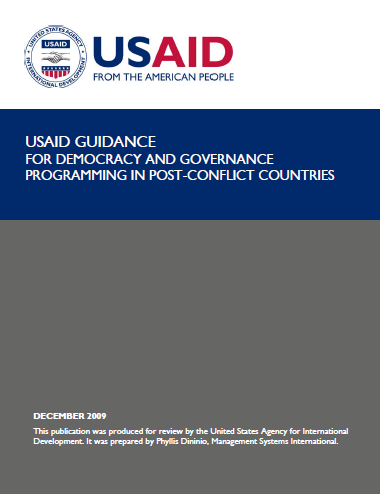Speeches Shim
The USAID Guidance for Democracy and Governance Programming in Post-Conflict Countries provides practical information to guide democracy and governance (DG) promotion in countries emerging from conflict. The guidance brings together lessons learned from past and current efforts with the aim of increasing the effectiveness and sustainability of DG programs. It proposes a new approach and provides concrete recommendations for strengthening democracy and improving governance in these challenging contexts. The target audience for this guidance is the US Agency for International Development (USAID) personnel who are responsible for developing and implementing DG field programs. The document also may be useful to other parts of the US government, including the State Department, the Defense Department, the Justice Department, and the National Security Council, and to others.
The purpose of DG programming in post-conflict countries is to support recovery from the conflict; to foster freedom, justice, and well-being; and to prevent a return to conflict. DG-related issues may have contributed to the outbreak of violence in the first place, for example, through corruption, impunity, limited freedom, fraudulent elections, or the inequitable access to government services. While democracy and governance initiatives are not the sole solution to resolving post-conflict issues, they clearly can be a significant part of the solution. Post-conflict DG interventions need to be an integral part of a comprehensive reconstruction and stabilization program.
The guidance is divided into two parts. Part 1, A New Approach to Post-Conflict Democracy and Governance, highlights the need to build effective, legitimate, and resilient states in the wake of conflict. Part 2, Programmatic Recommendations, discusses lessons learned and provides recommendations for programming in eleven DG subsectors:
Chapter 6: National Constituting Processes
Chapter 7: Transitional Governance
Chapter 8: Strengthening Ministries and Executive Branch Agencies
Chapter 9: Legislative Strengthening
Chapter 10: Local Governance
Chapter 11: Transparency/Anti-Corruption
Chapter 12: Elections
Chapter 13: Civil Society
Chapter 14: Justice and Reconciliation
Chapter 15: Security Sector Reform
Chapter 16: Disarmament, Demobilization, and Reintegration


Comment
Make a general inquiry or suggest an improvement.